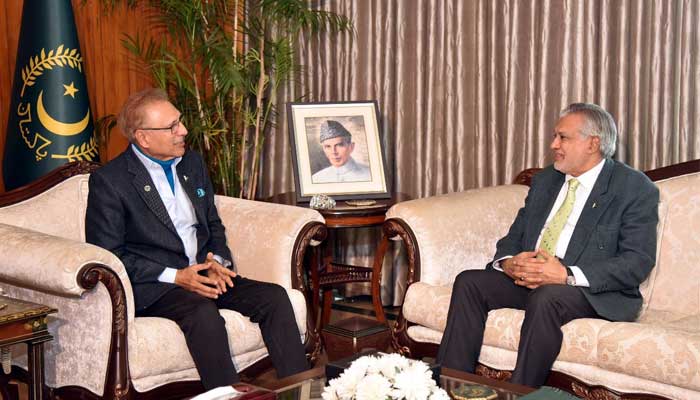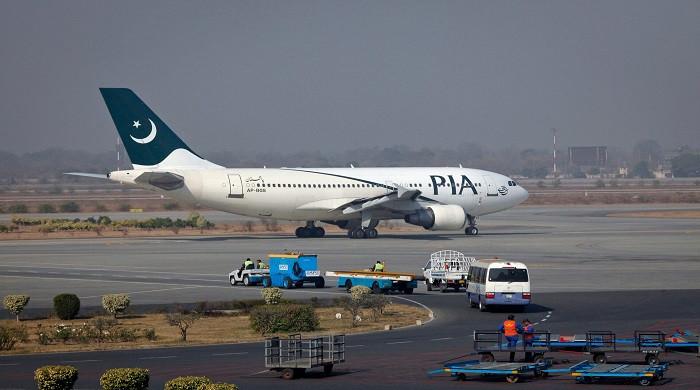Following president's advice, govt to move parliament for ‘mini budget’ nod
Dr Alvi advises taking parliament into confidence through immediate session to enact relevant legislation
February 14, 2023

- Finance minister briefs president about talks with IMF.
- President lauds govt's efforts amid negotiations with global lender.
- Govt to impose taxes via mini-budget to revive IMF deal.
ISLAMABAD: Following President Dr Arif Alvi's advice, the federal government has decided to present the 'mini-budget ordinance' in the parliament for approval as it scrambles to meet the International Monetary Fund's (IMF) pre-conditions for the stalled $1.1 billion loan.
Pakistan and the IMF have started virtual talks after 10 days of face-to-face discussions in Islamabad last week on how to keep the country afloat ended without a deal.
Senior officials of the finance ministry told Geo News that the bill would be laid down before the National Assembly and subsequently Senate tomorrow, following which both houses would refer the matter to their respective finance committees for further deliberations.
Once the bill was approved by both houses, it would be sent to the president for ratification, the officials said, noting that the move would fulfil all prerequisites of the IMF programme.
"Then, IMF and Pakistan will sign the Memorandum of Economic and Fiscal Policies (MEFP)," officials said and added, "Following which, the IMF executive board, on the recommendation of its team that visited Pakistan, will approve the release of the tranche".
After securing the IMF loan, Pakistan is expecting about $5 billion from friendly countries — China, Saudi Arabia, and UAE— and other multilateral lenders i.e., World Bank, Asian Development Bank, and the Asian Infrastructure Investment Bank (AIIB).
The development came after Federal Minister for Finance and Revenue Senator Ishaq Dar met Dr Alvi at the President's House.
"The president advised that it would be more appropriate to take parliament into confidence on this important subject, and that a session be called immediately so that the bill is enacted without delay," a statement issued by the President House said.
The president, in the meeting, was apprised by the finance minister about the government's progress in talks with the IMF.
Dar informed Dr Alvi that the government wanted to raise additional revenue taxes through the promulgation of the said ordinance. He also spoke about all the agreed-upon modalities with the global money-lending institution.
The finance minister, on February 10, said that parleys with the IMF ended "positively", however, the government would have to impose Rs170 billion in taxes through a mini-budget to revive the loan programme.
Addressing the media hours after the IMF issued its statement on its talks with Pakistan, Dar confirmed that Islamabad had received the draft of the MEFP from the Washington-based lender.
Meanwhile, Dr Alvi appreciated the efforts of Prime Minister Shehbaz Sharif-led government in negotiating an agreement with the IMF and also assured that the state of Pakistan would stand by the commitments made to the IMF.
During his presser last week, the finance minister also said that the 10-day-long discussions were extensive covering the power, and gas sectors as well as the fiscal and monetary side.
"The SBP governor and officials from different departments and ministries participated in the talks," Dar added.
Sharing broad contours of the understanding reached with the IMF, he had said taxation measures of Rs170 billion would be taken as opposed to the rumours of Rs700-800 billion.
The country's economy is in dire straits, stricken by a balance-of-payments crisis as it attempts to service high levels of external debt amid political chaos and deteriorating security.
Inflation has rocketed, the rupee has plummeted and the country can no longer afford imports, causing a severe decline in the industry.
The IMF is demanding that the nuclear-armed nation broaden its narrow tax base, end tax exemptions for the export sector, and raise artificially low petrol, electricity, and gas prices meant to help low-income families.
PM Shehbaz previously called the conditions for the $1.1 billion loan instalment "beyond imagination".












